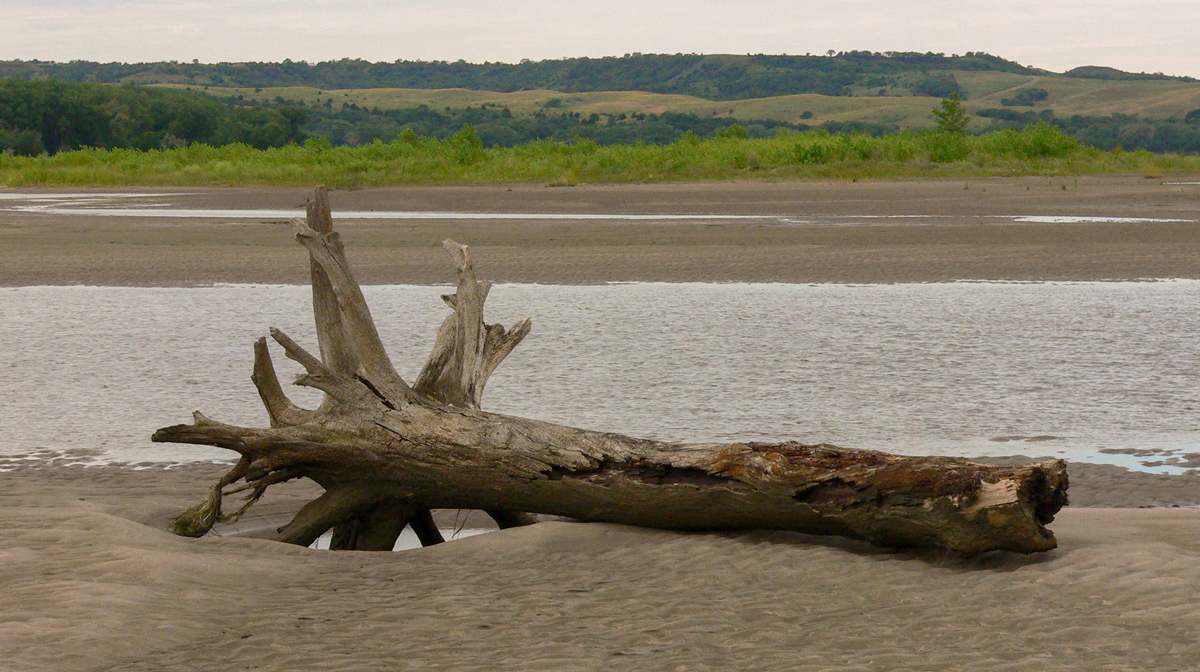The expedition travels fifteen miles up the Missouri and encamps southwest of present Modale, Iowa. The captains record yesterday’s speech to the Otoes, and Pvt. Moses Reed, who had headed back to the previous night’s camp to retrieve his knife, does not return as expected. Lewis collects a specimen of snow-on-the-mountain, and they pass an old trading house where Pvt. Cruzatte had worked.
Private Moses Reed Missing
by Yellowstone Public Radio[1]Originally aired weekdays by Yellowstone Public Radio during the Bicentennial observance of 2003-2006. Narrated by Hal Hansen. Scripts by Whit Hansen and Ed Jacobson. Produced by Leni Holliman. © … Continue reading
Snags and Eroding Banks
proceeded on passed thro betwen Snags which was quit across the Rivr the Channel Confined within 200 yards one Side a Sand pt. S S. the other a Bend, the Banks washing away & trees falling in constantly for 1 mile
—William Clark
Cruzatte’s Old Home
we passed an Old Tradeing house where one of our party passd. 2 years P. C. [Pierre Cruzatte] trading with the Mahar [The Omahas], & ponies [Pawnees].—
—John Ordway
Reed Goes Missing
[Moses] Reed the man who went back to the Camp of last night for his Knife has not Come up this evening—
—William Clark
Lost Specimen No. 27
No. 27. taken 4th of August, and furst observed at the bald prarie— it is beatifull plant with a variagated leaf—
—Meriwether Lewis
Moulton identifies this lost specimen, received by John Vaughn in 1805 (See The Donation Book), as Euphorbia marginata, snow-on-the-mountain. Another specimen, collected on 28 July 1806 survives in the Lewis and Clark Herbarium.[2]Gary E. Moulton, ed. Journals, “Fort Mandan Miscellany”, vol 3:458, 468.
To the Otoes
To the Petit Voleur, or Wear-ruge-nor, the great Chief of the Ottoes, to the Chiefs and Warriors of the Ottoes, and the Chiefs and Warriors of the Missouri nation residing with the Ottoes—
. . . . .
Children. Commissioned and sent by the great Chief of the Seventeen great nations of America, we have come to inform all the nations of red men who inhabit the borders of the Missouri, that a great council was lately held between this great chief of the Seventeen great nations of America, and your old fathers the french and Spaniards; and that in this great council it was agreed that all the white men of Louisiana, inhabiting the waters of the Missouri and Mississippi should obey the commands of this great chief; he has accordingly adopted them as his children and they now form one common family with us: your old traders are of this description; they are no longer the subjects of France or Spain, but have become the Citizens of the Seventeen great nations of america, and are bound to obey the commands of their great Chief the President who is now your only great father.
. . . . . .
Children. The great chief of the Seventeen great nations of America, impelled by his parental regard for his newly adopted children on the troubled waters, has sent us out to clear the road, remove every obstruction, and to make it the road of peace between himself and his red children, resideing there; to enquire into the Nature of their wants, and on our return to inform Him of them, in order that he may make the necessary arrangements for their relief, he has sent by us, one of his flags, a medal and some cloathes, such as he dresses his war chiefs with, which he directed should be given to the great chief of the Ottoe nation, to be kept by him, as a pledge of the sincerity with which he now offers you the hand of friendship.
. . . . .
Children. We are now on a long journey to the head of the Missouri; the length of this journey compelled us to load our boat and perogues [pirogues] with provisions, we have therefore brought but very few goods as presents for yourselves or any other nations which we may meet on our way. We are no traders, but have come to consult you on the subject of your trade; to open the road and prepare the way, in order that your nation may hereafter receive a regular and plentifull supply of goods.
. . . . .
Meriwether Lewis Captn.
1st U.S. Regt. Infantry.William Clark
Capt. on the Missouri Expedition[3]Letters of the Lewis and Clark Expedition with Related Documents: 1783–1854, 2nd ed., ed. Donald Jackson (Urbana: University of Illinois Press, 1978), 203–08.
Notes
| ↑1 | Originally aired weekdays by Yellowstone Public Radio during the Bicentennial observance of 2003-2006. Narrated by Hal Hansen. Scripts by Whit Hansen and Ed Jacobson. Produced by Leni Holliman. © 2003 by Yellowstone Public Radio. |
|---|---|
| ↑2 | Gary E. Moulton, ed. Journals, “Fort Mandan Miscellany”, vol 3:458, 468. |
| ↑3 | Letters of the Lewis and Clark Expedition with Related Documents: 1783–1854, 2nd ed., ed. Donald Jackson (Urbana: University of Illinois Press, 1978), 203–08. |
Experience the Lewis and Clark Trail
The Lewis and Clark Trail Experience—our sister site at lewisandclark.travel—connects the world to people and places on the Lewis and Clark Trail.
Discover More
- The Lewis and Clark Expedition: Day by Day by Gary E. Moulton (University of Nebraska Press, 2018). The story in prose, 14 May 1804–23 September 1806.
- The Lewis and Clark Journals: An American Epic of Discovery (abridged) by Gary E. Moulton (University of Nebraska Press, 2003). Selected journal excerpts, 14 May 1804–23 September 1806.
- The Lewis and Clark Journals. by Gary E. Moulton (University of Nebraska Press, 1983–2001). The complete story in 13 volumes.



